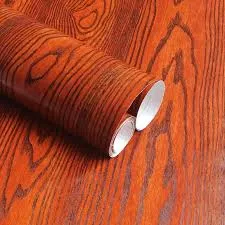- Home
- Connecting with Table Manufacturers for Sustainable Contact Paper Solutions
Nov . 27, 2024 19:00 Back to list
Connecting with Table Manufacturers for Sustainable Contact Paper Solutions
Contact Paper A Versatile Solution for Table Manufacturers
Contact paper, often referred to as adhesive vinyl or self-adhesive film, is rapidly gaining popularity in the world of furniture design and manufacturing, particularly among table manufacturers. This versatile material offers a multitude of advantages that can enhance both the functionality and aesthetic appeal of table products. This article delves into the uses, benefits, and practical considerations of contact paper in table manufacturing.
What is Contact Paper?
Contact paper is a thin, flexible sheet of vinyl that comes with an adhesive backing. It can be purchased in various colors, patterns, and finishes, making it an appealing choice for manufacturers looking to cater to diverse consumer tastes. Typically, it is used to cover surfaces, providing a quick and cost-effective solution for updating or refreshing the appearance of furniture.
Benefits for Table Manufacturers
1. Cost-Effectiveness One of the primary benefits of using contact paper is its affordability. For table manufacturers operating on tight budgets, this material allows for significant design creativity without the need for expensive high-end materials. Instead of investing in solid wood or high-quality laminates, manufacturers can opt for contact paper to achieve similar aesthetics at a fraction of the cost.
2. Ease of Application Contact paper is straightforward to apply, which reduces labor costs during the manufacturing process. It can be cut to size, repositioned, and smoothly adhered to surfaces with minimal effort. This ease of use allows manufacturers to produce tables more efficiently, streamlining production timelines while maintaining high-quality finishes.
3. Variety of Designs The aesthetic versatility of contact paper is unmatched. From natural wood grains to vibrant patterns, contact paper can mimic a wide array of materials. This enables manufacturers to offer a broader range of designs, catering to contemporary trends such as minimalism, bohemian styles, and industrial aesthetics. Customers are often drawn to unique and customizable table options, which can be achieved through various contact paper designs.
4. Durability and Protection Modern contact papers are designed to offer durability and resistance to wear, moisture, and stains. This makes them suitable for tables that experience heavy use, such as dining or coffee tables. By applying contact paper, manufacturers can enhance the lifespan of their products and provide customers with easy-to-clean surfaces that stand up well to daily wear and tear.
contact paper to cover table manufacturers

5. Environmentally Friendly Options With increasing consumer awareness regarding sustainability, many contact paper manufacturers offer eco-friendly options. These products are often made from recycled materials or feature non-toxic adhesives, appealing to environmentally conscious consumers. This gives table manufacturers a chance to market their products as sustainable, which can significantly influence purchasing decisions.
Considerations for Manufacturers
Despite its many advantages, there are considerations that table manufacturers should keep in mind when using contact paper
- Surface Preparation For optimal adhesion and finish, surfaces must be clean, smooth, and free of any debris before applying contact paper. Manufacturers need to invest time in ensuring that tables are properly prepared.
- Longevity While contact paper is durable, it's essential for manufacturers to inform customers about its lifespan, especially in high-traffic areas. Over time, the adhesive may degrade or the surface could peel, depending on usage.
- Consumer Education To maximize customer satisfaction, manufacturers may need to educate consumers on proper maintenance and care for contact paper surfaces. Clear guidelines can enhance the user experience, ensuring that customers are happy with their purchase.
Conclusion
In summary, contact paper presents a flexible and cost-effective solution for table manufacturers striving to provide aesthetically appealing and functional products. By leveraging the benefits of this versatile material, manufacturers can create innovative designs that meet the diverse needs of consumers while maintaining sustainability and cost-efficiency. As trends in furniture design continue to evolve, contact paper will likely remain an indispensable tool in the arsenal of modern table manufacturing.
Latest news
-
High-Quality Bathroom Cabinet Contact Paper – Durable & Stylish Leading Suppliers, Exporters, Manufacturers
NewsJul.08,2025
-
Premium Wood Contact Paper for Desk – Reliable Suppliers & Exporters
NewsJul.08,2025
-
Premium Contact Paper for Table Top – Durable & Stylish Surface Solution from Leading Manufacturer
NewsJul.07,2025
-
Duplex Board with Grey Back - Reliable Supplier & Competitive Price Manufacturer & Exporter
NewsJul.07,2025
-
Premium White Contact Paper on Cabinets – Trusted Exporters & Suppliers
NewsJul.06,2025
-
High-Quality Duplex Board Packaging for Food Reliable Manufacturer & Supplier
NewsJul.06,2025

